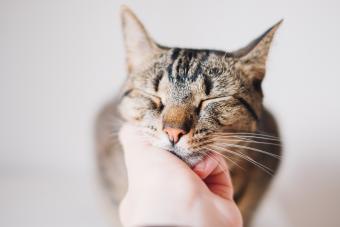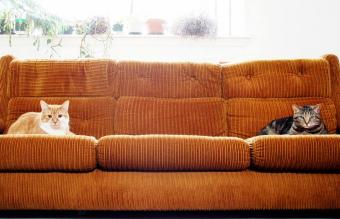
It can be eerie when you catch your cat staring at the wall for no apparent reason. While it may seem strange, this is a fairly common behavior among cats. There are a few cases where staring at the wall should cause you to worry, although most of the reasons have to do with your cat being their quirky self.
1. Your Cat Is Watching Something
Some aspects of your cat's vision aren't as good as yours. They have a hard time focusing on items that are close, and they can't see as many colors as we can. However, your cat's wide range of vision puts them at an advantage.
They're also able to see details we can't, and cats are especially good at tracking movement with their eyes. Even in the dark, your cat's vision is significantly better than yours, so they could be watching something you can't even see.
Cats have six to eight times more rod cells than us, allowing them to see more detail in low light.
2. Your Cat Is Tuned in to Its Sense of Hearing
There's a common misconception that cats can't hear as well as our dogs can. However, they can hear up to a range of 64,000 Hz (which is the range of frequency they can hear). That's pretty high. To put this in perspective, the range for human hearing ends around the 23,000 Hz mark.
This means your cat could be hearing something your ears won't pick up on, perhaps between your walls. It could be creaky pipes in your settling home or squirrels playing with one another outside.
3. Your Cat Is Hunting
Cats are natural-born hunters, and their instincts can be triggered by the smallest stimuli. Sometimes, it may appear as if they're looking at the wall, when in reality, they're staying still to get ready to pounce. Cats love to hunt and, if they can't stay still, they won't be successful in their venture.
If your cat is staring at the wall, wait a few minutes to see if your kitty starts chasing something. Even if you can't see it, that doesn't mean there isn't something there. My cat chases small moths and flies if she happens to see them, and I don't see what she's chasing until she goes to pounce.
4. They're Daydreaming
Like us, our cats may simply stare into space when they're thinking about something. Their gaze may appear to be set on the wall, but they're actually not staring at anything specific.
It's kind of like how we zone out when we're thinking deeply about a situation. They might be lost in their thoughts, contemplating the mysteries of their nine lives, or simply taking a mental break from their busy routine of napping, grooming, and playing.
It Could Signal a Health Problem
Sometimes, cat staring isn't just an innocent pastime. Normally you can tell the difference, because cats who stare for more concerning reasons show signs you'll notice pretty quickly. Prolonged and frequent wall-staring, especially when combined with other unusual behaviors, could be cause for alarm.
You don't need to worry most of the time unless you notice your cat behaving in ways that stand out as abnormal. Cognitive Dysfunction Syndrome (CDS), Feline Hyperesthesia Syndrome (FHS), and head pressing are three of the primary conditions to be on the lookout for.

5. Cognitive Dysfunction Syndrome
Cognitive Dysfunction Syndrome, also known as CDS, sometimes affects older cats. It is similar to Alzheimer's disease in humans and involves the gradual deterioration of cognitive abilities that are often noticed as behavioral changes. Signs of CDS in cats can include:
- Disorientation: Affected cats may seem confused or lost, even in familiar environments. They might have difficulty finding their litter box or food dish, or get stuck in corners.
- Changes in interactions: Cats with CDS may not have as much as interest in people or other pets as they once did, and they can become unusually aggressive.
- Sleep disturbances: You may notice changes in their sleep-wake cycles, often sleeping more in the daytime and becoming restless or agitated at night.
- House soiling: Cats with CDS may not recall where the litterbox is or even that they're supposed to use it, resulting in accidents around the house.
- Changes in activity levels: Your cat may not exercise as much and display increased aimless wandering or repetitive behaviors, such as staring at walls.
6. Feline Hyperesthesia Syndrome
Feline hyperesthesia syndrome, also known as rolling skin disease, is a neurological condition that affects cats. Cats with this condition could have sudden, exaggerated reactions to being touched. You may also notice:
- Excessive grooming leading to hair loss
- Unprovoked aggressive behavior
- Dilated pupils
- Skin rippling on the back
Cats with feline hyperesthesia syndrome often hallucinate. You may notice them chasing invisible prey or staring at the wall. Episodes can last seconds to minutes and often end as abruptly as they started.
The exact cause of feline hyperesthesia syndrome is idiopathic, which means it's unknown. Treatment often involves managing the individual cat's symptoms and may include medications, behavioral therapy, and maintaining a calm, stress-free environment for the cat.
Feline hyperesthesia syndrome may be linked to seizure disorders. In two cases involving cats diagnosed with FHS, symptoms were significantly reduced with anticonvulsant therapy.
Head Pressing in Cats
If your cat is pressing their head against the wall, they could have a neurological condition. It won't look like they're affectionately rubbing against the wall, but rather pressing their head hard against the wall or on other objects. Conditions that might lead to head pressing include:
- Brain tumors
- Head trauma
- Encephalitis
- Metabolic disorders
- Conditions leading to high blood pressure
If you notice your cat pressing their head like this, it's crucial to consult with a veterinarian immediately. Your vet will run diagnostic tests to find out the underlying cause and suggest appropriate treatment options to manage the condition.
Don't Worry, But Keep Watch
Observing your cat's behavior can be as mystifying as it is endearing. While a cat staring at the wall is usually harmless and part of their puzzling charm, it's important to stay aware of any changes in their usual behavior patterns. When in doubt, always consult with a professional to ensure the wellbeing of your furry feline. After all, even though they might seem like independent creatures, our cats rely on us for their health and happiness.







